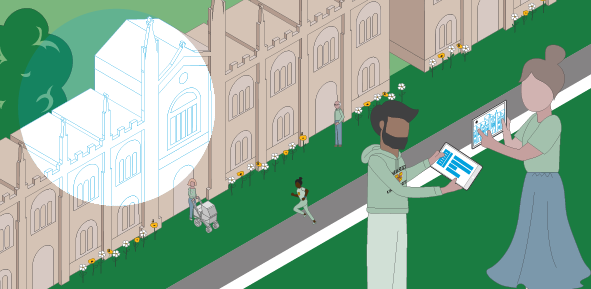
Our Challenge
CDBB’s vision of the future involved buildings and infrastructure that are “smart”, capturing data about performance to predict when maintenance would be needed, understand how users are engaging with the services they provide and ensure that they are as efficient, sustainable and resilient as possible in a changing climate.
Our Solution
By applying research to real-world buildings and systems, CDBB and partners were developing the tools and guidance the built environment sectors need to embrace digitalisation. From wireless sensor networks that capture the performance of multiple buildings at the same time, to city digital twin interfaces that predict future needs in order to help planners develop better transport services, the living laboratory tests and develops technology that will underpin the digital built Britain of the future.
Projects within this theme
| Projects in this theme | Lead researcher |
|---|---|
|
West Cambridge Digital Twin Research Facility Enabling practical, in-the-wild exploration of the challenges associated with the production of a National Digital Twin - an ecosystem of connected digital twins, securely sharing infrastructure information to support better outcomes for us all. |
|
|
Exploiting traffic data to improve asset management and citizen quality of life Building on a tool developed by two Cambridge PhD students that allows for the generation of high-resolution, geographical data heat maps, this project explores how these maps can help to solve optimisation problems relevant to citizens’ everyday lives. |
Dr Ajith Kumar Parlikad |
|
Crowdsourcing Data in Mining Spatial Urban Activities Understanding how check-in data from social media is distributed around Cambridge, UK, and what kinds of spatial segmentation can be identified. Pilots were compared with a prior study of Ningbo in China for an international perspective. |
Dr Elisabette Silva |
|
IOT Network Behaviours and Dependencies Exploring the types and rates of data off-the-shelf IOT sensors will generate and distribute, the supporting services they will invoke and the infrastructure dependencies they imply for digital built Britain. |
Dr Richard Mortier |
|
A digital twin prototype for journeys to work in Cambridge An early trial to address the research gap on city-level digital twins. This pilot is focused on commutes, such as journeys to work, which are a key determinant of peak-time travel demand. Examining the potential impacts of digital transformation on journeys to work in the Cambridge sub-region. |
Dr Li Wan |
|
Ancillary Sensing for Building Information Modelling: Current Practice and Future Research Developing two separate current frameworks for practice, policy and future research under the umbrella theme of ancillary (additional) sensing for BIM. Highlighting the role that sensor-enabled human behaviour research can play to inform the creation, design and operation of better physical spaces. |
Dr Mohamed Zaki |
|
Stakeholder Engagement in Smart Cities and Digital Infrastructure Projects Considering effective stakeholder engagement in Smart Cities and Digital Infrastructure projects, including individuals, communities, interest groups, local authorities, universities, businesses and other users of the built environment. |
Dr Gemma Burgess |
|
Case Study: Towards a digitally enabled estate: the University of Cambridge This report describes the uses of BIM technologies and implementation of BIM processes, examples of its benefits and some of the main lessons learned during Project Capella, which forms part of the University’s Biomedical Campus. |
Thayla Zomer |

